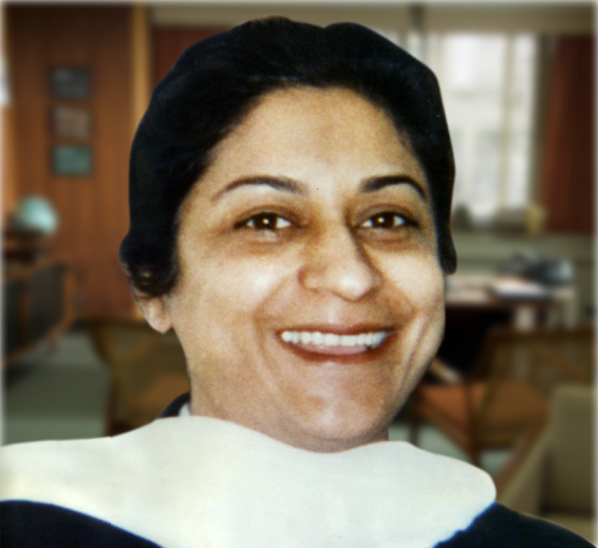- ASMA JAHANGIR, a lawyer, strives to apply the laws of her country fairly; but where the laws of Pakistan do not conform to a humane and equitable standard, she also strives to change them.
- Under new laws promulgated amid the Islamization of the 1980s, a woman in Pakistan who accuses a man of rape may easily fall victim to the countercharge of zina, the crime of adultery and sex-out-of-wedlock.
- JAHANGIR’s law firm advises and defends such women and pleads forcefully against laws that jeopardize females.
- The RMAF board of trustees recognizes her challenging Pakistan to embrace and uphold the principles of religious tolerance, gender equality, and equal protection under the law.
“All citizens are equal before law and are entitled to equal protection of law.†This and other fundamental rights are enshrined within the Constitution of Pakistan. Yet recent efforts to Islamize Pakistan have compromised the secular spirit of the constitution: laws protecting women have been weakened; blasphemy against the Prophet Muhammad is now punishable by death. According to the Human Rights Commission of Pakistan, it is common in Pakistan today for women and girls to be assaulted, raped, and murdered without any practical recourse to justice; at the same time, minority sects and free thinkers in the country stand virtually unprotected against malicious attacks by religious zealots.
Under these vexing circumstances, ASMA JAHANGIR, a lawyer, strives to apply the laws of her country fairly; but where the laws of Pakistan do not conform to a humane and equitable standard, she also strives to change them.
JAHANGIR was only eighteen years old when she stepped into the limelight to challenge her father’s arrest by Pakistan’s martial law government. By the age of twenty-eight, she had married and opened a law practice in Lahore with her sister, Hina Jilani, and two other women. Most of her clients were women. For them, JAHANGIR and her partners often represented the only hope for justice in a society where traditional attitudes and practices weighed heavily against females. As her law practice grew, JAHANGIR threw herself into the broad struggle for reform in Pakistan. She clashed fearlessly with the military government of Zia-ul Haq and, in 1984, was arrested for sedition. In 1986, she became founding secretary-general of the Human Rights Commission of Pakistan, dedicated to documenting the rampant mistreatment and exploitation of women, children, minorities, and laborers and to bringing Pakistan within the pale of international human rights standards.
Under new laws promulgated amid the Islamization of the 1980s, a woman in Pakistan who accuses a man of rape may easily fall victim to the countercharge of zina, the crime of adultery and sex-out-of-wedlock. Over 80 percent of the women in jail in Pakistan today have been arrested on exactly this charge. JAHANGIR’s law firm advises and defends such women and pleads forcefully against laws that jeopardize females; meanwhile, its free legal aid center provides reader-friendly pamphlets and a team of paralegal assistants to educate women about their current rights and legal options.
Pakistan’s blasphemy law is notoriously subject to abuse. Victims of spurious charges (in some cases, illiterate youths and targets of personal vendettas—Christian and Muslim alike) have been herded into court or, worse, beaten or murdered by fanatical self-anointed religious Purifiers. JAHANGIR calls the law “terrifying†and has defended several of its victims, winning important victories in the Supreme Court. She is mobilizing support for the law’s repeal and, in the meantime, for safeguards against its capricious abuse.
Asked to become Pakistan’s first woman judge in 1994, JAHANGIR declined, saying, “It would be hypocrisy to be a judge and defend laws that I don’t believe in.â€
Working ten hours a day and more, with not enough time to savor her three children, ASMA JAHANGIR struggles on many fronts to stem the tide of theocratization and lawlessness in Pakistan. She is optimistic. As the outcome hangs in the balance, however, her bold stand for pluralism and fundamental human rights angers the country’s religious conservatives and zealots. Some merely stigmatize her as a “modern woman.†Others threaten to kill her.
In electing ASMA JAHANGIR to receive the 1995 Ramon Magsaysay Award for Public Service, the board of trustees recognizes her challenging Pakistan to embrace and uphold the principles of religious tolerance, gender equality, and equal protection under the law.
It is a great honor for me to accept this prestigious award. My colleagues of the human rights movement and I thank you for this support. My struggle is not a lonely one but a struggle shared by many women and men of integrity and purpose. We are committed to uphold those values of human rights that call for equality, justice, and equity for all peoples—a world without discrimination of any manner whatsoever, a world where people can live a life free of exploitation.
The Magsaysay Award has a special significance, as it comes from a country that is rich with a tradition of liberation movements and a society that has the most active and robust social action groups. This honor bestowed by you is like recognition by one’s own family, which has its own special value.
While I accept the award, I feel embarrassed as well. Embarrassed when I compare what little we have achieved against what has still to be achieved. Our first small steps are only the beginning of a very long, arduous, and painful struggle to establish justice in our societies. By complementing and coordinating our efforts as fellow Asians, we are sure to strengthen our cause. This award has placed a grave responsibility on me to prove worthy of it. I assure you that your generosity will assist me in spawning similar awards for human rights and civil liberties in Pakistan.
On behalf of my husband and myself, I thank the trustees of the Ramon Magsaysay Award Foundation for their warm hospitality and an opportunity to visit this beautiful country.

